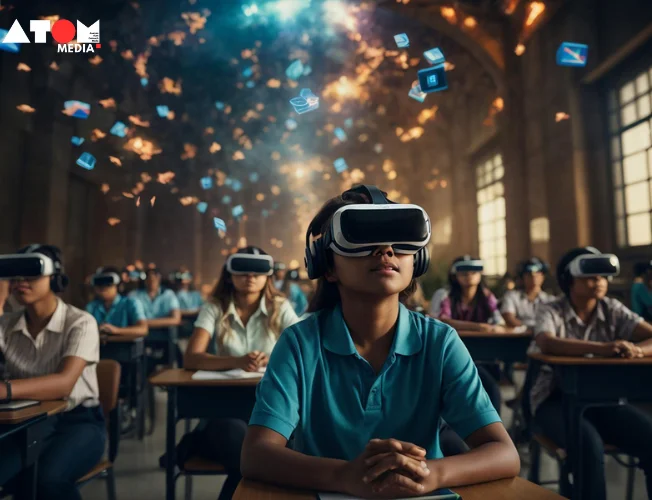In the rapidly evolving landscape of education, the metaverse is emerging as a game-changer. Virtual workshops within this digital realm are revolutionizing the way we learn, offering hands-on experiences, fostering teamwork, and providing personalized lessons. The integration of virtual reality (VR) in education is still relatively new, but it is gaining traction at an unprecedented pace. Experts predict that the metaverse education market will reach an impressive $24.7 billion by 2030, showcasing a 43.76% compound annual growth rate (CAGR) during the 2023-2030 forecast period (Statista).
The Rise of the Metaverse in Education
The metaverse presents a transformative opportunity to revolutionize learning and skill development. By transcending the limitations of traditional education, it offers an engaging platform that significantly enhances how we acquire knowledge and develop skills. A study conducted on school students in Beijing highlighted the effectiveness of VR-based curricula, where students scored 20 percentage points higher than those following traditional methods, with an average score of 93% compared to 73%.
Immersive and Experiential Learning
One of the most compelling advantages of the metaverse is its ability to create immersive environments that mirror real-life scenarios. Learners can engage with realistic simulations, allowing them to practice skills in a risk-free virtual space. Imagine medical students performing complex surgeries without any real-world consequences or architects exploring virtual building designs before actual construction. This hands-on approach not only enhances skill acquisition but also boosts confidence, making learning more practical and relatable.
A study by Saga University in Japan demonstrated the impact of VR on brain activity. Students learning with VR headsets showed a remarkable 15.5-point increase in brain activity compared to a mere 3.0-point increase for those in traditional classroom settings.
Global Accessibility and Collaboration
The metaverse transcends geographical barriers, offering global accessibility and fostering collaboration. Learners from around the world can participate in virtual workshops and educational events, eliminating the need for physical travel. This democratization of education enables individuals to access high-quality learning opportunities regardless of their location or socioeconomic status. Additionally, the metaverse promotes cross-cultural exchange and teamwork, as participants from diverse backgrounds can collaborate in shared virtual spaces, enriching the learning experience.
Personalized and Adaptive Learning
Another significant advantage of the metaverse is its ability to tailor learning experiences to individual needs and preferences. Virtual environments can be customized to cater to different learning styles, whether visual, auditory, or kinesthetic. Difficulty levels can be adjusted based on the learner’s pace, ensuring a personalized and effective educational journey. This adaptability promotes inclusivity, allowing learners with diverse abilities to access education in a way that suits them best.
Interactive and Immersive Simulations
The metaverse offers an opportunity for interactive simulations that closely mimic real-world scenarios. From virtual cockpits for pilot training to simulated environments for engineers to test machinery, these immersive experiences provide a safe and cost-effective platform for skill development. In fields like healthcare, students can practice virtual surgeries, enhancing their abilities without risking patient safety. These simulations not only improve technical skills but also foster critical thinking and decision-making abilities, preparing learners for real-life challenges.
Collaborative and Teamwork-Oriented Learning
Collaboration and teamwork are essential skills in today’s interconnected world, and the metaverse provides an ideal platform for cultivating these abilities. Virtual workshops and educational events allow participants from different locations to work together in real-time, tackling complex projects and simulating real-world team dynamics. This collaborative approach fosters problem-solving, communication, and innovation, preparing learners for a globally connected workforce.
Cost-Effective and Scalable Solutions
One of the significant advantages of virtual workshops and educational events in the metaverse is their cost-effectiveness. By eliminating the need for physical infrastructure and travel expenses, organizations can offer comprehensive training programs at a fraction of the cost. This cost-efficiency not only facilitates more frequent and varied learning opportunities but also makes high-quality education more accessible to smaller organizations and individuals, democratizing learning opportunities.
Industry Adoption and Impact
The PwC 2022 US Metaverse Survey found that 51% of companies are either in the process of integrating VR into their strategy or have already built VR into at least one dedicated line of business. Thirty-four percent stated that one of the biggest metaverse benefits they foresee is “a more effective way to develop and train our people.” PwC implemented virtual reality soft skills training for some of its employees, replacing traditional, in-classroom forms of instruction. The results were striking: VR-trained employees were four times more focused and felt 275% more confident in applying the skills they learned after the training ended. Additionally, PwC found that learning in virtual reality enabled training to occur four times faster than traditional in-person or online training, saving companies valuable time and money.
The Future of Learning in the Metaverse
In the metaverse, learning is evolving. Virtual workshops offer hands-on learning, teamwork, and personalized lessons. This immersive space allows learners to explore knowledge in engaging, interactive ways, preparing them for the future. As the metaverse continues to expand, its impact on education will likely grow, offering innovative solutions to traditional learning challenges and creating new opportunities for learners worldwide.
The shift towards VR education is not just a trend; it represents a fundamental transformation in how we approach learning and skill development. With the potential to provide immersive, accessible, and personalized education, the metaverse is poised to become a cornerstone of modern education. As we continue to explore and harness the power of this technology, the future of learning looks incredibly promising.
Read more: Marketing News, Advertising News, PR and Finance News, Digital News





